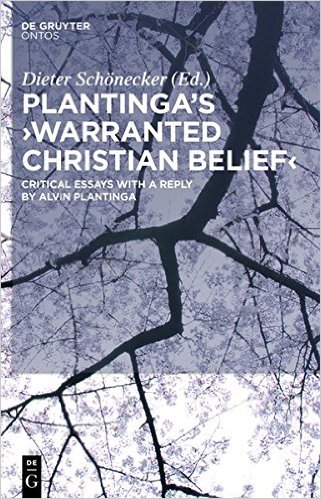 Plantinga’s Warranted Christian Belief: Critical Essays with a Reply by Alvin Platinga, ed. Dieter Schonecker (De Gruyter, 2015), 270 pages.
Plantinga’s Warranted Christian Belief: Critical Essays with a Reply by Alvin Platinga, ed. Dieter Schonecker (De Gruyter, 2015), 270 pages.
In the last half of the 20th century, many consider Alvin Plantinga to be the most important philosopher of religion. His work in the area of epistemology has been widely read and widely engaged by both Christian and non-Christian philosophers alike. In his magnum opus Warranted Christian Belief (hereafter WCB), which is the third book in a trilogy of books on warrant, Plantinga seeks to put forth a cogent model of Christian belief to show that if Christianity is true, it is warranted.
In this work, Dieter Schonecker (University of Siegen) has edited nine essays from various German philosophers, theologians and one mathematician that critically engage with Plantinga’s model of Christian belief in various ways. I will give an overview of some of the chapters, and reflect on Plantinga’s responses.
The first essay by the editor Schonecker seeks to first do a historical sketch through Platinga’s previous works (God and Other Minds and Reason & Belief in God) to show that the argument put forth in WCB is a parity of an argument in these former books. This chapter is a great introduction not only into Plantinga’s A/C model, but also into his work in general. Much can be learned in here for the lay Christian looking to understand Plantinga.
The third essay by Winfried Loffler (Universtity of Innsbruck) is in my opinion one of the more interesting essays because he seeks to show an underrated merit of Plantinga’s philosophy, which Loffler calls world-view beliefs. World-view beliefs, as Loffler defines them, are to be “understood as a bundle of axiological, evaluative stances with high political and often religious relevance” (66). This is not just about what one thinks about abortion or a certain topic, but is much more general and more theoretical in character. This way of looking at world-view beliefs is about the ‘general structure of orientation in our thinking, it provides an interpretation of all the manifold phenomena that we come across in our lives…’ (66). This is what Plantinga’s philosophy attends to, and what Loffler attempts (successfully, I believe) to show as an underrated portion of Plantinga’s philosophy.
In the fifth essay Thomas Schartl (Universtity of Augsburg) offers a critical analysis of Plantinga’s conception of certainty, and offers a concept of certainty in the tradition of Ludwig Wiggenstein that he proposes does more justice to the peculiarity of religious belief in general. Schartl says to bring revelation into the field of philosophy is disastrous. After quoting a portion of WCB, Schartl makes the interesting claim that Plantinga’s concept of a “sensus divinitatis is plain Barthianism in disguise” (126). I don’t necessarily see Barthianism negatively, as Schartl does. After all, one of my favorite books of the last few years Theology’s Epistemological Dillema: How Karl Barth and Alvin Plantinga Provide A Unified Response, seeks to show how the work of both Barth and Plantinga can be a wonderful response and position to hold in response to the modern dilemma of religious belief.
Georg Plasger’s (University of Siegen) provocative essay seeks to show that Plantinga does not rightly interpret Calvin’s sensus divinitatis, and how the A/C model is not rightly named. He sketches out Calvin’s thought on human knowledge of God, and to see if Calvin uses the sensus divinitatis as Plantinga wants to use it; “a kind of faculty or cognitive mechanism” (WCB, 172).
The final essay of the book by Gregor Nickel (University of Siegen) is most likely the most difficult essay for those not well versed in logic and probabilistic reasoning. He doubts the use of probabilistic reasoning within religious epistemology, with a background focus on the debate between Plantinga and Richard Swinburne on “dwindling probabilities.” Nickel uses a lot of symbolic logic, and towards the beginning of the chapter defines what each symbol and propositions stands for.
At the end of the book Alvin Plantinga offers replies to each individual essay. I found this to be clarifying, especially on the more critical essays. Plantinga is gracious as always, and generous in his replies. As he writes at the beginning of the essay; “I deeply admire and appreciate these series of essays on my work, the more so since they emanate from Germany with its magnificent philosophical tradition.” Each reply is a good length, and gives some good responses to various issues. In his reply to Schartl, Plantinga even admits to not understanding some of what Schartl was getting at: “There is a good bit of what Schartl says that I can’t claim to understand…” (249) It is wonderful to see a man of Plantinga’s stature in the field of philosophy to be humble enough to admit ignorance in some areas. Ultimately Plantinga is successful in dealing with the various problems some of the essays bring up.
All in all this is a wonderful and challenging group of essays that will be helpful not only in understanding Plantinga’s work, but to even help further develop some of Plantinga’s underdeveloped thought (i.e. Loffler’s essay). If one is unfamiliar with current epistemological research, one should read some introductory works first and, for Plantinga’s thought, should read his lay-level book Knowledge and Christian Belief, which summarizes WCB.
Preview or buy the book here.

